Spoken Word Reviews
FESTIVAL SPOKEN WORDS - Buxton Spoken Words
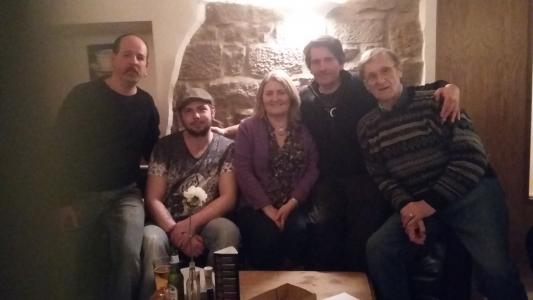
What a wonderful way to while away a surprisingly sultry summer's evening at the Buxton Festival Fringe. If I had even once shred of the collective creativity and outstanding originality of these 7 inspirational individuals who performed last night in a packed and very warm Tea Chest, I would be writing this in verse! Sadly, I am no match for these home-grown wordsmiths who treated us to a delightful and rich showcase of their individual talents, each cleverly and personally introduced by the Master MC and the founder of Telling Tales (the pre-cursor of Spoken Words) Julian Cohen, who demonstrated his own prodigious mastery of language and wit with his trademark acerbic assonance. I suspect the evening was more carefully structured and crafted than our convivial compere would have us believe and the selected repertoire covered an impressive variety of poetic styles and genres: from passionate poetry (that I thought was begging to be set to rap music), across saucy tongue twisters, haiku-esque brain teasers/ giggle inducers, to spell binding dramatic tales, firmly rooted by impressive historical detail in Buxton and the surrounding locale. Polemic political pieces appeared to be carefully chosen for optimum hilarity. All were lapped up by listeners straining from the doorway to hear.
Each poet came on twice and showed us their literary personalities through two or three of their own pieces either side of a short interval- which itself inspired one of, in my opinion, Julian's best poems, apparently at the height of his creative mojo- and each part of the evening culminated in a hugely imaginative, narrative tale first of a ghostly roman prostitute, then a gory fratricide, written and read by Les Oldfield.
It wasn't all high jinx though. A powerful shift of tone was achieved in the first half, through the inclusion of a small and heartbreaking theatrical piece, 'Our Darren', written by Alison Wheeler and hauntingly performed by Jill Neves. I wonder if a small stage might have elevated the performers in more ways than one. Derek Baker opened with some heart warming and reflective pieces, 'Almost too late' & 'Jilted' which while tinged with regret, never verged on sentimental, revealed his self effacing humour and mature moral musings, a distinct sauciness alongside a romantic heart. Dave Greenan, the 'Bard of Tideswell' created evocative and at times hard hitting realistic and rhythmic pictures in works such as 'The Inside Man' & 'For Joseph'. His 'The Seagull' struck an emotional chord with many. Karl Largan, master of the pun and punchline, treated us to a series of clever yet accessible poems: who would have thought the humble dictionary could be so funny!! No less insightful or enjoyable was the younger voice of the remarkable Ryan Tomlinson. His intelligent poetry took us from the irreverent inner monologue of an insane president to some darker, futuristic and contemplative places (including his/our own mind) as well as the vociferously political. His verse was tightly constructed, ambitious and utterly inspiring.
Julian, of course, had the last words which were warm, playful and appreciative. I left this magical event awash with new mental images and a full heart, wondering at the exquisite intensity of our beautiful language, intrigued by the performers' inspirations and seeing my home town in a whole new light. This event and the quality of the writing and performances
Katie Barrett
FORGET ME NOT – THE ALZHEIMER'S WHODUNNIT - Rob Gee

You would think that any performance with the word ‘alzheimers’ in it would be a put off except possibly for those who have been affected by it or have a special interest. Even so it could be a dry hour full of misery and gloom. Step forward then Rob Gee who had the audience laughing out loud at his descriptions of a psychiatric ward and knowing laughs about their own memory ‘not being what it used to be’.
The Fringe programme has this show categorised as ‘Spoken Word’ but it could just as easily be ‘Theatre’ or ‘Comedy’ as Rob related a tale of murders in a sub-standard elderly ‘challenging behaviour’ ward (i.e. violent).
The central character, Jim a former police detective, smells a rat after the violent death of his wife. The problem is he also has dementia. As he notes, ‘ a case worthy of the greatest detective mind. But his will have to do’. A couple more bodies appear soon after and the plot thickens but just as Jim reaches a breakthrough...he forgets what it was.
The characterisation is as accurate as a former psychiatric nurse can make it and the story is told with real warmth and empathy towards the patients. An anecdote about the’ baffle lock’ on the ward doors to keep patients in while complying with the mental health regulations is wry and hilarious and typical of Rob’s approach.
Much of the show is told in rhyme and Rob has won a number of awards in poetry slams and other festivals. The first show was almost sold out and there are two further shows on 10th and 11th. If festivals for you are the opportunity to reach beyond your comfort zone and try something wholly original then you should try to catch the few remaining tickets quickly as word of mouth recommendations will surely mean he will be sold out.
Brian Kirman
THE GLUMMER TWINS - David Harmer and Ray Globe

The Glummer Twins are David Harmer and Ray Globe. These guys are seriously funny. Not in the Stewart Lee ‘listen to my brilliant brain working’ sense; they are just funny blokes. From the outset with Ray sneaking on self-consciously to turn on their taped intro, it is warm and self-mocking but clever too. They send themselves up mercilessly while exploring the quirky goings-on of the last fifty years. They are nostalgic, two middle-aged blokes looking back on their lives and covering a wide range of subjects from mods and rockers to the 70s disco scene in Rotherham but it is never cloying. They also cover the perils of assembling an Ikea flat-pack. They have obviously spent time working on their lyrics and perform them well. Even the ad-libs are written down and well-rehearsed!
They do come over as an end-of the-pier Morecambe and Wise double-act crossed with the infectious rhythms of John Cooper Clarke, with a nod to Pam Ayres , Vivian Stanshall and the Bonzo Dog Band and even Barnsley’s Ian McMillan. They write very good light verse with music. Many pieces are backed with fast rap beats performed at breakneck pace. One piece featured Ray Globe playing blues guitar. I especially liked The Bob Dylan take-off ‘Mediterranean Homesick Blues’. There was a surprising rap about Donald Trump too!
It was stiflingly hot in the venue but The Glummer Twins performed with great gusto to an audience of about twenty people, even including some dancing and ‘costume-work’. It was a great night out and it was a joy to watch two well-rehearsed but self-effacing performers doing their stuff.
I recommend you catch them at Underground at the Clubhouse on 13th or 20th July at 1pm
Terry Naylor
HEADING FOR THE HILLS - Peter and Gillian Byrom-Smith
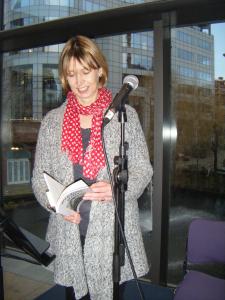
On a rare, sultry, Buxton summer evening, Gillian and Peter Byrom-Smith brought their ‘tales in words and music’ to The Green Man Gallery as the sunshine gently set outside and the light became golden.
On the small, corner stage of what is an old dance hall, they took it in turns: Peter played the classical guitar and Gillian read from her collection of poems – the music and the words linked together by their shared love of nature and their closeness to each other. Interspersed with anecdotes about their lives and their art, the evening had an intimate quality, especially as they did not use microphones and the acoustics of the gallery really worked well for the guitar (a little less so for Peter’s soft spoken voice which was a little hard to hear at times).
Peter, who told most of the stories between pieces, had a difficult early life and no formal musical education, is a self-trained musician who now composes and arranges in many genres from orchestral pieces to rock music, with commissions in many countries, most recently, Japan. He is passionate about music but freely admits he is “rubbish at anything else”. Gillian wrote when she was younger, but only really started to write seriously again when the couple met ten years ago. Now Peter has turned some of her words into songs.
Gillian’s influences are mainly musical and include Bob Dylan, Patti Smith and Joni Mitchell though the style of her poetry doesn’t really reflect this. She does, however, want her poetry to be “accessible to everybody.” Peter was enormously inspired by Elgar as a young man especially as he too came from humble beginnings.
Gillian’s gentle, simple, free-verse poems and Peter’s delicately played original guitar music fitted well together and are inspired by nature: from hills to woods to the sea. The poems and music also reflect the couple’s actual life and their ‘creative life’ together walking/working in different landscapes from York to Malvern to Berwick-upon-Tweed. They have recently moved to Glossop. They clearly have a fascinating, symbiotic artistic relationship which is both heart-warming and inspiring.
Karey Lucas-Hughes
HISTORYPOD: LIVE - Scott Allsop

I must declare an interest here; I was not a neutral observer of this event, I was a participant, for a part of it. One of the never-ending debates amongst historians is about the possibility (or otherwise) of historical truth. There are some facts that all can agree on but how facts come to be selected and then understood or explained is another matter.
Part of today’s recording for Scott Allsop’s Historypod is to be made available on Tuesday 11th July - World Fringe Day - and Scott had invited me, as Chair of the Buxton Fringe, to answer some questions about our Fringe and Fringes more generally. Those are the facts. If you want to hear what we said - and Scott gave a very interesting summary of the early days of the Edinburgh Festival Fringe - then you should sign up to receive his daily podcast.
That was all a smallish part of what Scott recorded for delivery in the coming days. He has been podcasting for over two years and every day he delivers three minutes or so on known historical events that happened on that calendar date. He explained some of the limitations and problems behind this strategy. The history of calendars themselves presents problems. For many known events there is no certainty about the date on which they occurred and the use of different calendars in different cultures and countries adds to the uncertainty.
Scott also acknowledged that his chosen approach resulted in a bias towards European and American events - in part because of the way in which those cultures have dominated and shaped world events over the last six centuries which is the period during which calendar dates have been by and large agreed.
Scott also recorded an episode focusing on the well known story of the murder in his bath of the French revolutionary Marat. It was fascinating - make sure to sign up to receive the daily podcast - www.historypod.net.
Keith Savage
HOW TO BE PERFECT... IN YOUR OWN WAY - Georgina Kirk

Georgina Kirk’s ‘How to be Perfect’ is a reflective and intriguing discussion on the social concept of perfection. Set in a small room in The Green Man Gallery, the intimate setting is perfect for audience engagement and I believe I speak for everyone when I say we all felt truly connected with Georgina’s words.
Whilst, due to the nature of this being spoken word, we spent most of the hour listening to Georgina communicating and analysing her ideas to us, the talk was refreshingly interactive; time was left for questions at the end and during the piece we were often asked to reflect and question our own lives in relation to what was being expressed – as promised, there were indeed ‘lots of lightbulb moments’.
The talk centred around Georgina’s own definition of ‘perfection’ and how it has been moulded by her own life experiences. What was especially interesting was the relation between the ideal of perfection and the social pressures we face that affect our ability to reach our goals. A key theme that was focused on was the competitive nature of humans, and how this can limit our progress – I found this discussion particularly relevant as it links clearly with the impact that technology – such as social media – has on us as individuals. ‘How to be Perfect’ is a refreshing and in depth look on a very relatable and pressing issue and offers warm and helpful solutions to the ‘perfectionist’ tendencies many of us face on a day to day basis.
Towards the end of the talk the idea of ‘balanced’ perfection was discussed and the relationship between being happy in the moment and striving for future goals was examined in detail. I found this to be particularly useful for practical self-help application as it lent itself very well to the philosophies of mindfulness and positive thinking. This is indeed a rewarding debate to witness and become involved in – I do recommend.
Articulate and engaging, Georgina made good use of her limited speaking time. My only critique would be at points, the pace could have picked up – however the pauses along the way fittingly gave time for reflective thinking.
If you are interested in analysing the self and exploring ways to better your own thought process, ‘How to be Perfect’ certainly shouldn’t be missed!
Sara Gunton
LOVE & COFFEE - Bryce Main

Bryce Main performed some readings from his book Love and Coffee. The book contains about a hundred short stories about love and relationships as observed in a coffee shop. Each story is two pages long. This is the ultimate coffee table book. All the stories are set in a coffee shop and each story is intended to be read over a cup of coffee. Every story also contains a reference to a classic song.
The stories are inspired by Bryce's people watching at a cafe near his office. The owner of the cafe in the stories is a woman called "Little Italy" who runs the cafe with the help of her sidekick "Big Red". A jukebox on the wall of the coffee shop plays the songs. The first story he read was called "The girl with the butterfly tattoo". The girl's tattoo is called Hector the Protector and it was supposed to save her from getting involved with the wrong men. The next story was "Heels on wheels" whose heroine wears stilettos despite travelling in a wheelchair. In a story called "Blind date" two people end up on the same table by accident. He has a stick and she has a guide dog.
The audience loved Bryce's readings and he signed several books. He informed us that he was working on the sequel. "Love and Coffee , the Refill". You can buy the book on Amazon and follow Bryce Main on Facebook.
Alex Watts
PSYCHICBREAD - Mark Gwynne Jones
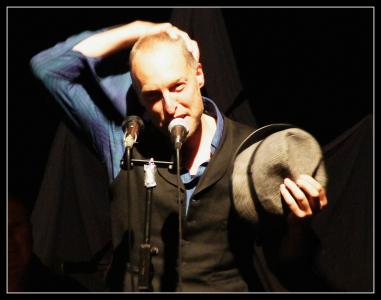
My friend described seeing Mark Gwynne Jones play the clubhouse several years ago and was wowed by the transformation from that performance to this. I am new to his work and so I am looking at it fresh without knowing any history.
Mark is a poet with great stage presence. One of my first thoughts was that his delivery is reminiscent of John Cooper Clarke. The performance of his poems has rhythm and is very funny. He ad libs all the time like a stand up comic.
Most of his poems have musical accompaniment. His band is Nick the Hat on guitar, Anna Kerr on Keyboards and Alex Ivanov on drums. The band complimented Mark's poems and were perhaps at their best in "The End of the World Show" in which their music suggested overtones of Pink Floyd's The Wall and the Beatles For the Benefit of Mr Kite.
Mark's poems range from the satire of "Digital man" through domestic humour of "The tortoise and the rubber shoe" and the romance of "Wild garlic and the freckled trout" to some more surreal poems whose names I did not catch.
The light show to complement the performance was unvarying and a bit disappointing. I kept wishing for a better visual backdrop to explain and compliment Mark's vivid and evocative words. Also sometimes the music drowned out Mark's voice which was a pity and I wonder if more pared down music arrangements might enhance the words of Mark's poems.
I understand that this show is a work in progress and, as such, it was very promising. Mark is a talented performance poet and with very good band. Their next performance will be at Wirksworth Town Hall on 15th September.
Alex Watts
THE UNSUNG - Genevieve Carver and The Unsung Funeral Band
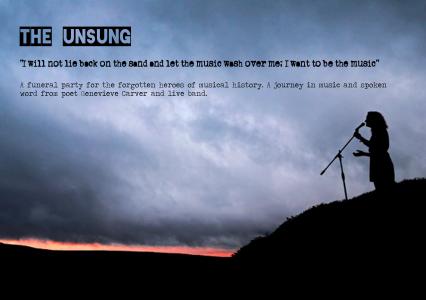
Buxton Fringe can produce some lovely surprises, and these are often tucked away in the smaller categories - last year’s Beautiful Game from Next Door Dance is a good example. After last night’s show at St Peter’s Church I’m convinced this year’s gem is The Unsung, written and performed by Genevieve Carver accompanied by The Unsung Funeral Band. There’s tragedy and death in this show but don’t let this put you off. The show commemorates the otherwise forgotten heroes of musical history and the overall experience is an uplifting one.
Sheffield-based Genevieve, usually known as Gevi, is well established on the local and national spoken word and poetry scene and performs regularly at a number of prestigious events. The backing band are well-known musicians from the Sheffield area: Sarah Sharp on violin, keyboards, guitar and backing vocals, Tim Knowles, guitar and ukulele and Brian Bestall, drums and percussion.
St Peter’s is on the edge of the town but it was an ideal venue for this show and attracted a good audience including several other Fringe performers- always a good sign! There was a lovely touch at the beginning with the Reverend Carl making everybody welcome and introducing the show with obvious enthusiasm. Gevi and the Band then got straight into their own musical introduction to the main part of the show.
There were nine pieces, each given an informative introduction by Gevi. This was interesting and useful, a lot of the names weren’t immediately familiar. The material, well researched and wide-ranging, includes the Costa Concordia, Lina Prokofiev, the neglected wife of Sergei, through to Shifty Mick from the Sheffield underworld. I particularly enjoyed a piece about a recent but little-known conflict in Mali, with the band providing an authentic West African sound.
Gevi is an accomplished performer, varying the rhythm and dynamics throughout with sensitive backing from the band. Changing the instrumentation added variety, and Gevi played the piano to accompany herself on three of the pieces. After a very effective ending, Gevi thanked everybody before mingling with the audience and band while refreshments were served by the friendly St Peter’s volunteers, another nice touch which made a perfect end to the evening.
Highly recommended, but if you missed this one-off show it was the first of a seven-date tour, with several venues in easy reach of Buxton. There might be a further tour later in the year.
Finally, some of the musicians can be seen as part of Chronology Jazz Trio at Buxton’s Pavilion Arts Centre in September.
Sam Slide
VERA BRITTAIN'S TALE: A TESTAMENT TO A LOST YOUTH - Discover Buxton Tours
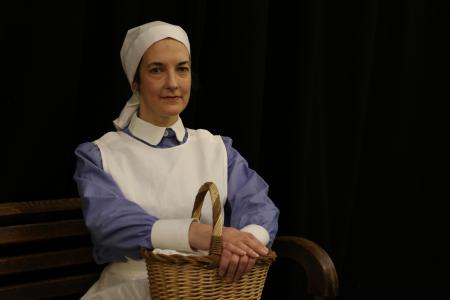
After it was proved both unsuccessful and un-necessary as stables (largely because of the coming of The Railway) Buxton’s wonderful Dome became used as a hospital. As time passed, it grew from being a small hospital for locals to being fully used for the injured and the recuperating of the First World War.
Vera Brittain, who went on to become the famous writer, feminist, and pacifist, was brought up in the staid old-fashioned Buxton of the time and kicked over the traces in her dis-satisfaction with social life here. She gave up her hard-won university place at Oxford after just one year to become a Voluntary Aid Detachment (V.A.D.) nurse at the Dome.
This one-actor show is a fascinating – and successful – combination of two key elements: a well-informed tour in character round the Dome, outlining its history as a hospital, and a description and commentary on Brittain’s feelings and attitudes as she worked with the injured, suffered the strains of ‘superior’ matrons, became exhausted with the hard and incessant work, and developed her ideas and her morality.
It’s a sterling performance from Sarah Gordon who welcomes us in full nurse’s clothing and walks us round the fascinating building: fully in character, she ‘discovers’ aspects of the past (an old weighing chair, for instance, or photographs) which remind her of events of the time, and the life of the hospital. We hear about her rather-rebellious youth – heading off into the Dales for long walks, something no normal well-brought-up girl would do; and rebelling against the idea of the then-normal life of domesticity which faced women. And about all the experiences which led her towards her subsequent feminist and pacifist life.
The script is by Vanessa Highet and plainly draws on Brittain’s own writing: Sarah Gordon is fully in character throughout, and beautifully sustains the style, the walk, the manner and the accent: what’s more, she plainly knows herself a great deal about Brittain and is able to answer questions from the audience at the end of the show – again, fully in character.
Directed by Netta Christie, it’s a gentle promenade piece, though there are spells when the audience can sit down along the way. And of course along the way the normal daily life of the Dome is going on: it doesn’t interfere with the flow, but succeeds in adding another dimension to the one-hour show.
Michael Quine
A VICTORIAN CONVERSATION - Discover Buxton Tours
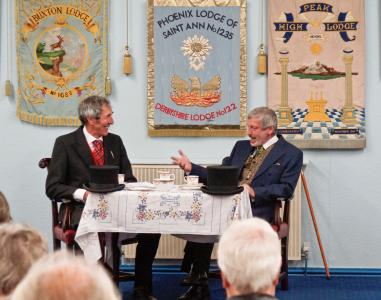
This event is an imagined conversation taking place at about 1880 between two of the eminent Victorians responsible for the development of Buxton as a Spa resort. These were Robert Rippon Duke who was the architect for the Dome, Octagon, Palace Hotel and many of Buxton's residential streets and Edward Milner who designed the Pavilion Gardens. The evening was a charming history lesson about Buxton and the gentlemen were dressed for the part with their frock coats , canes and top hats.
They mentioned in passing the long history of Buxton's Springs and the visits from Mary Queen of the Scotts when she was kept under house arrest by the Earl of Shrewsbury. However most of their time was spent discussing their contemporary events such as the arrival of the railways bringing hoards of tourists looking for something to do. This had been the motivation for creating the Pavilion Gardens and the Octagon concert hall. They explained the Spa treatments in some detail and with great humour. The Dome of the Devonshire Royal Hospital was also as hot discussion topic since Robert Rippon Duke had just converted John Carr's hundred year old stables and added the the largest dome in Europe inspired by the Pantheon dome in Rome. The conversation felt very natural as if the audience was eaves dropping on a real conversation as these gents swapped anecdotes about their childhood and kept up a running joke about eccles cakes and the poor service in the imagined tea room.
The audience thoroughly enjoyed the evening which concluded with the Grand Master of the Lodge giving us a lively history of the Masonic Hall which was hosting the event.
Alex Watts



